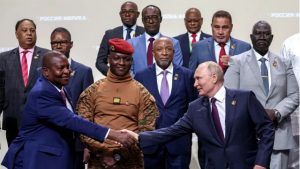 Russian President Vladimir Putin says his country and the African leaders attending a summit in St Petersburg have agreed to promote a multipolar world order and fight “neocolonialism” as he offered debt write-offs and grain to woo allies.
Russian President Vladimir Putin says his country and the African leaders attending a summit in St Petersburg have agreed to promote a multipolar world order and fight “neocolonialism” as he offered debt write-offs and grain to woo allies.
“Russia’s attention to Africa is steadily growing,” Putin said on Friday at the end of the two-day summit. The meeting was seen as a test of Moscow’s support in Africa, where Russia retains backing despite international isolation sparked by its war in Ukraine.
On Thursday, the Russian leader promised free grain to six African nations and assured them that Moscow was trying to avert a global food crisis nearly a week after withdrawing from an agreement that allowed Ukraine, one of the world’s largest grain producers, to export its farm products across the Black Sea.
The Russian leader also mentioned the “joint determination to counter neocolonialism, the practice of applying illegitimate sanctions and attempts to undermine traditional moral values”.
Representatives of 49 countries, including 17 heads of state, attended the summit in the Russian city.
Participants signed a joint declaration that called for “the establishment of a more just, balanced and stable multipolar world order, firmly opposing all types of international confrontation in the African continent”.
‘New initiative towards Africa’
Al Jazeera’s Ali Hashem, reporting from St Petersburg, said the declaration is Russia’s “new initiative towards Africa”.
“There is a Russian plan for Africa,” he said, adding that there are “very ambitious initiatives” from Putin.
“Russia wants to gain Africa allies. This is why it’s initiating more and more towards Africa – to the extent that President Putin wants to … revive the Soviet era investments in Africa,” he said.
According to Hashem, Russia plans on building plants and factories and increasing diplomatic missions on the continent.
Putin is also promising to maintain grain supplies to Africa after he withdrew from the Black Sea grain deal. He is blaming the West for higher food prices and inflation and said the global economic system is going through significant change.
Africa is the “new centre of power. Its political and economic role is growing exponentially. … Everyone will have to take this reality into account,” he said.
For several years, the Kremlin has openly engaged in diplomatic and economic offensives on the continent and offered security services in the form of the Wagner mercenary army to African governments fending off armed group.
But in recent months, Russia has had to speed up its quest for alternatives to European partners.
Foreign Minister Sergey Lavrov has toured Africa twice since January, seeking to draw it into Moscow’s camp and presenting Russia as a bulwark against Western “imperialism” and “neocolonialism”.
Calls to end war on Ukraine
African leaders pressed Putin to move ahead with their peace plan to end the Ukraine conflict.
While not directly critical of Russia, their interventions on the second day of a summit were more concerted and forceful than those that African countries have voiced previously.
They served as reminders of the depth of African concern at the consequences of the war, especially rising food prices.
“This war must end, and it can only end on the basis of justice and reason,” African Union Commission Chairman Moussa Faki Mahamat told Putin and African leaders at the summit.
“The disruptions of energy and grain supplies must end immediately. The grain deal must be extended for the benefit of all the peoples of the world, Africans in particular.”
Republic of the Congo President Denis Sassou Nguesso said the African initiative “deserves the closest attention” as he called “urgently” for peace.
Senegalese President Macky Sall sought “a de-escalation to help create calm” while South African President Cyril Ramaphosa said he hoped that “constructive engagement and negotiation” could help end the conflict.
The summit took place in the wake of the Russian withdrawal from the grain deal. The suspension of the deal, which had helped stabilise global food prices and avert shortages, increased fears of a global food crisis.
Putin reiterated that Russia would “continue to supply African friends with grain crops both on a contractual basis and free of charge”.
Putin added the leaders had agreed to improve cooperation on aid, energy and trade, including by “consistently switching to national currencies for commercial transactions”.
The Russian leader also pledged to wipe out the debts of Africa.
Many of the leaders had warm words for Moscow’s record of support for their countries in their 20th-century liberation struggles, and the final declaration promised Russia would help them seek compensation for the damage done by colonial rule and secure the restoration of plundered cultural treasures.
